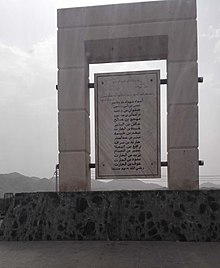Mehjaa' ibn Saleh (Arabic: مهجع بن صالح, d. 624 CE) was a Sahaba from the tribe of Banu 'Akk. Mehjaa' participated in the Battle of Badr and was reportedly the first of the Muslims to have been killed in action.
Mehjaa' ibn Saleh | |
|---|---|
مهجع بن صالح | |
 The names of the martyrs who were slain in the Battle of Badr, on a commemorative plaque; including Mehjaa' ibn Saleh | |
| Died | 624 CE |
| Known for | Being one of Muhammad's companions |
Biography
editMehjaa' ibn Salih was of Yemeni descent.[1] Muslim scholar Ibn Hajar states that he was descended from the Yemeni Banu 'Akk tribe.[2] Mehjaa' was taken into captivity by the Quraysh when he was in Mecca, but was eventually freed by Umar ibn al-Khattab who had converted to Islam.[1][2]
Death
editMehjaa' was amongst the Muslim fighters in the Battle of Badr.[1][2] He was killed by a polytheist named 'Amir ibn al-Hadhrami. Mehjaa' left no descendants.[1][2]
Legacy
editMehjaa' is honoured and remembered by Muslims as the first Muslim casualty in the Battle of Badr.[1][2][3] He was buried in a plot of land adjacent to the battlefield, that is currently not accessible to the public.[4]
Some Muslim scholars[5][6] stated the Qur'anic verse 6:52 was revealed about him;
See also
editReferences
edit- ^ a b c d e Ibn Sa'd (1998). Kitab Tabaqat al-Kubra [The Book of Major Classes]. Beirut, Lebanon: Dar Sader.
- ^ a b c d e Ibn Ḥajar al-Asqalani (2010). al-Iṣābah fī tamyīz al-ṣaḥābah. Beirut, Lebanon: Dar Al Kutub Al Ilmiyah. ISBN 9782745135070.
- ^ "Mihja, Umayr, and Ubayda (ra): The Martyrs of Badr | The Firsts". Yaqeen Institute for Islamic Research. Retrieved 2024-09-09.
- ^ Landmarks, Islamic (2014-01-06). "Burial place of the Martyrs of the Battle of Badr". IslamicLandmarks.com. Retrieved 2024-09-09.
- ^ Ibn al-Athir. Usd al-ghabah fi marifat al-Saḥabah. Beirut, Lebanon: Dar Ibn Hazm. ISBN 9789953816210
- ^ Guezzou, Mokrane (2008). Tanwir al-Miqbas min Tafsir Ibn Abbas: Translated into English. Amman, Jordan: Royal Aal Al Bayt Institute For Islamic Thought.
- ^ Qur'an 6:52, translation of Mustafa Khattab in The Clear Qur'an